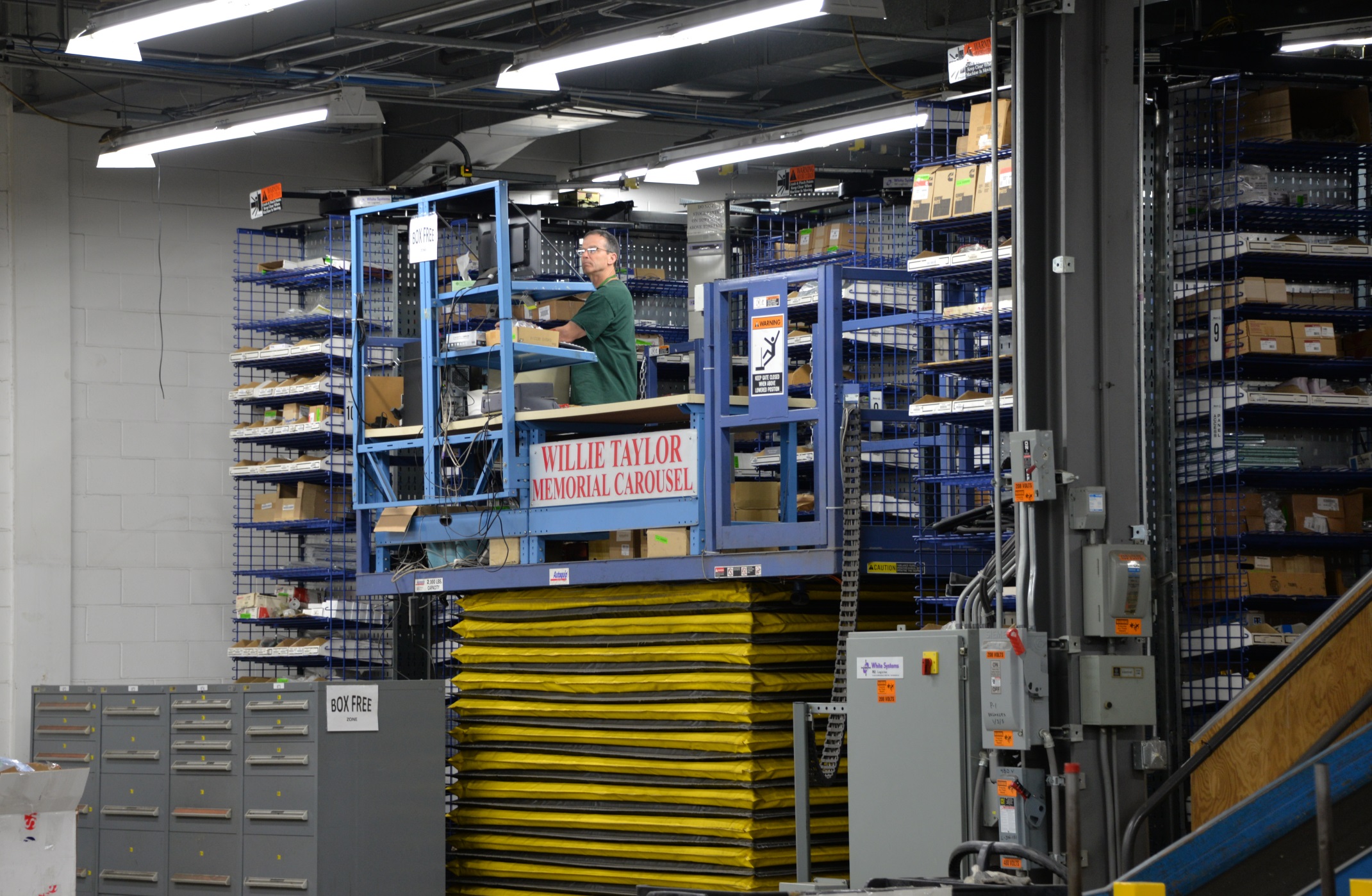 Head Stockkeeper Michelle Bellfield likes to think of her work the same way she thinks about filling her refrigerator at home.
Head Stockkeeper Michelle Bellfield likes to think of her work the same way she thinks about filling her refrigerator at home.
“There are the things you use every day, like milk or eggs, that you always want to have on hand,” she said. “And then there all the other things you use once in a while, so you only get them when you need them.”
Bellfield’s metaphor is a good way to sum up the philosophy that drives the Materials Management Department, which includes more than 40 employees working at Metro Transit facilities across the Twin Cities.
The scale of the operation, though, is quite a bit grander than what you’d encounter in the kitchen.
More than 18,000 unique items are included on Metro Transit’s constantly-evolving shopping list, including everything from exhaust filters and alternators to bolts, toilet paper and disposable gloves. Among the largest and most valuable items in the inventory is a transformer that comes within an inch of the ceiling at the Rail Support Facility.
At the end of 2016, the collective inventory had a combined value of nearly $40 million, the majority of which represented rail equipment like the trucks that sit beneath the passenger car and move light-rail trains down the track.
Amid this dizzying array of items and a constant stream of new deliveries, Materials Management keeps a close eye on what’s coming in and going out.
The goal is simple: have parts and supplies available in a timely fashion, without investing too heavily in items that wind up sitting idle on a shelf.
“That’s our real challenge — figuring out which mechanic at which garage is going to need that one part and when they’re going to need it,” said Chris Haefner, Materials Management Manager.
Despite the challenges, Materials Management has built a record of success. Requested items are almost always available immediately, keeping the time buses or trains are out of service while waiting on parts at a minimum.
That record partly reflects the fact that the majority of the organization’s needs are fairly predictable, with around 1,000 items accounting for about 70 percent of the inventory. But there are also 15,000 items that make up a much smaller share of the inventory.
One way Materials Management controls the supply is by only stocking items that are requested two or more times within a six-month period.
Software that has been in use since 2015 has also helped Materials Management become more precise, using historical data to predict future needs and guide purchases. Just 15 percent of Metro Transit’s inventory has been forecasted to date, a share that will grow over time, but around $750,000 in savings has already been realized.
Another challenge for Materials Management is simply keeping track of everything that comes through Metro Transit’s doors. Deliveries arrive daily at five different locations, including the 50,000-square-foot warehouse at the Overhaul Base.
There, a computer system linked to a massive machine with rotating shelves helps stockkeeepers store new deliveries and pull supplies ordered by service garages and other work locations, which go out daily.
“It’s really an amazing machine,” said Lead Stockkeeper Ong Vang, standing on a platform that rises to reach the top shelves.
Between these activities, stockkeepers here and at other sites are prompted to manually count dozens of items each day, contributing to a “cycle count” that replaces what would be an otherwise overwhelming, annual task. In 2016, these counts almost exactly matched recorded inventory.
Haefner said those results reflect how seriously stockeepers, analysts and planners in Materials Management take their work.
“Our mission is to be responsible stewards of the taxpayers’ money while also supporting our internal customers,” he said. “Everyone in our group takes that very seriously.”
 Members of the Materials Management Department, from left to right: Head Stockkeeper Stephanie Armstead, Lead Stockkeeper Ong Vang, Manager Chris Haefner, Head Stockkeepr Michelle Bellfied, Head Stockkeeper Dan Alcaraz, Inventory Analyst Jason Adams, Garage Stockroom Coordinator Bill Neuenfeldt and Supervisor/Material Planner Mike Rood.
Members of the Materials Management Department, from left to right: Head Stockkeeper Stephanie Armstead, Lead Stockkeeper Ong Vang, Manager Chris Haefner, Head Stockkeepr Michelle Bellfied, Head Stockkeeper Dan Alcaraz, Inventory Analyst Jason Adams, Garage Stockroom Coordinator Bill Neuenfeldt and Supervisor/Material Planner Mike Rood.